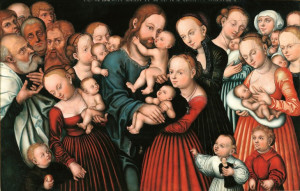Thoughts on Today’s Lessons for Oct. 4, 2015

Christ Blessing the Children, 1540s; Lucas Cranach the Elder, 1472–1553. The Metropolitan Museum of Art.
Today’s readings don’t seem easy. First, we hear a part of the creation narrative in that some have interpreted to diminish the status of women. Mark’s Gospel reflects those words in a rejection of divorce so strict that it has been invoked to hold people in abusive relationships. Can we read these faithfully, yet more generously? Perhaps they speak more broadly of creation and the universal call to men and women to take responsibility for our relationships with plants, animals and each other. This is a good thought to hold as we celebrate St. Francis’ day with our Blessing of the Animals.
Psalm: Psalm 8
A psalm that begins as a hymn of praise turns to a catalog of the glories of God’s creation: The heavens, the moon, the stars, all the work of God’s hands, are so great that mere humanity seems small in comparison. Yet we are given charge of all the wild and domestic animals and creatures of the sea. Surely we are called to exercise the same careful and loving stewardship over this creation as we count on God to provide for us.
Second Reading: Hebrews 1:1-4; 2:5-12
Today we begin seven weeks with the letter to the Hebrews, a journey that will carry us to the end of Pentecost. Hebrews is thought to be an ancient letter to Jewish Christians who had returned to Judaism for fear of persecution. While it is fervently pro-Christian, we should take care not to read parts of it as anti-Jewish. Today’s verses echo Psalm 8 in recognizing humanity’s God-given stewardship over creation. We should be mindful of creation as God, through Jesus, is mindful of us.
Gospel: Mark 10:2-16
These are hard words to hear in a modern society where divorce has become acceptable, if unhappy; a difficult end to a relationship. In the patriarchal culture of Jesus’ time, though, it was even worse: A man could set aside his marriage for any reason in a world where a woman alone had no option but to beg, risking homelessness and starvation. Of course Jesus came down hard on that! Further, most modern theologians agree that Jesus quoting Genesis on “male and female” addressed relationship, rather than today’s understanding of same-gender love. Finally, when we look at the innocence of a child, we begin to grasp Jesus’ idea of God’s kingdom. Don’t judge others. Don’t be unkind.
